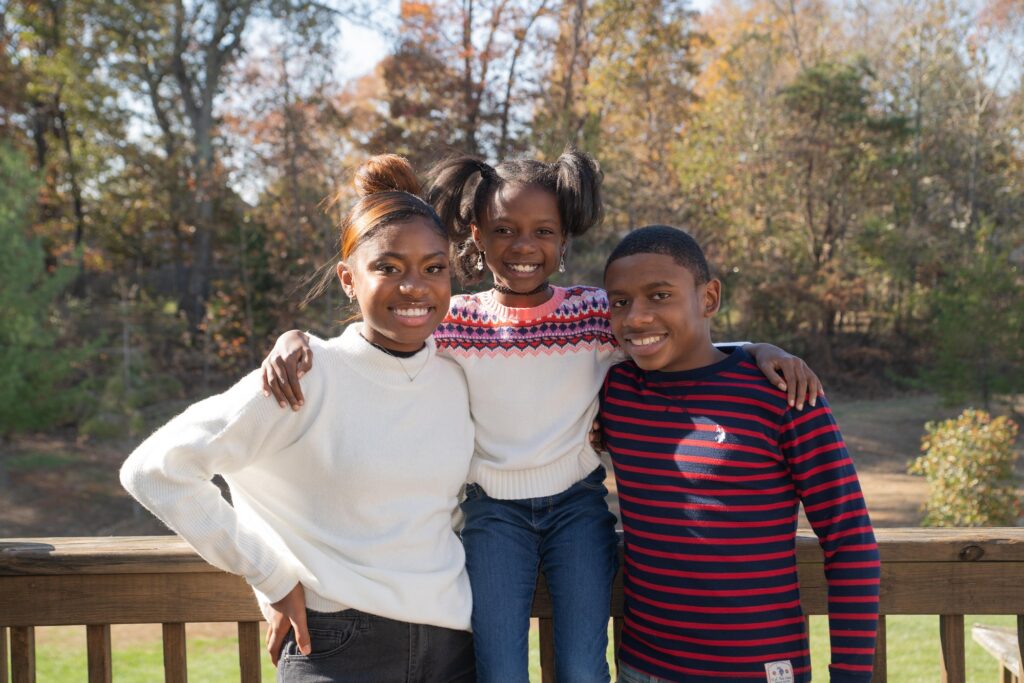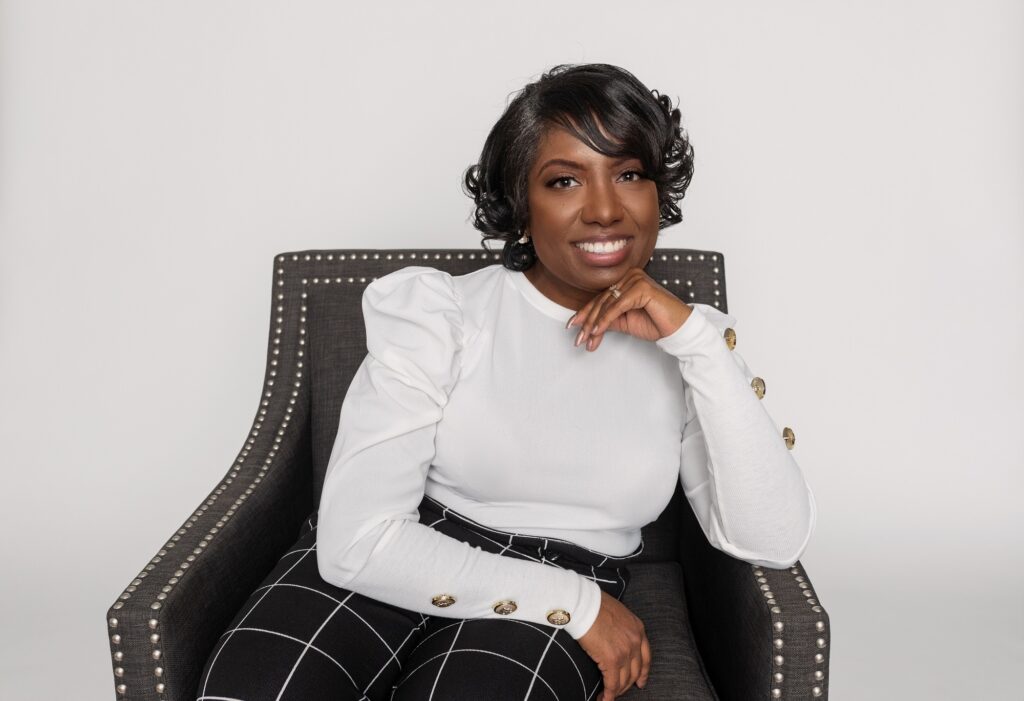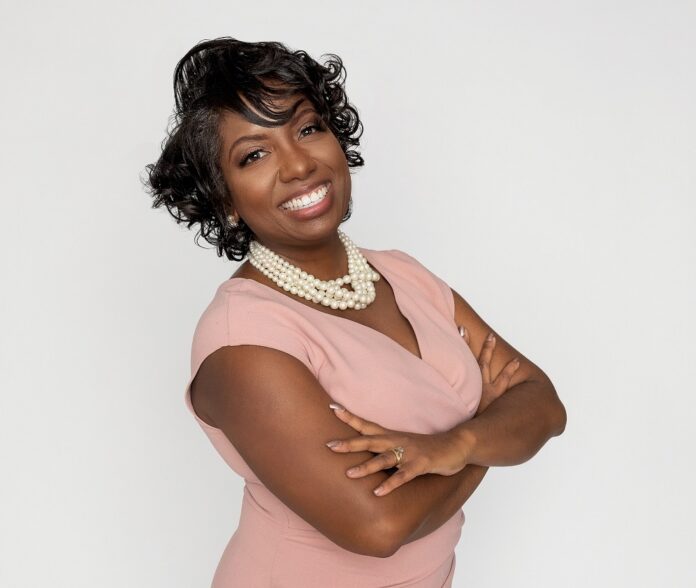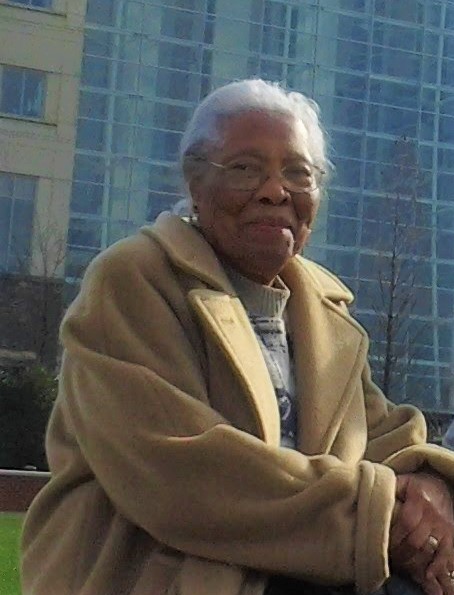Photography By Beth Graeme
Southern Maryland Woman sat down with Tracie Daniels, the founder of Synergy Consulting – a training and development firm – to learn about who she is and how she became so passionate about leveraging the best in all of us to improve teamwork, awareness, and business outcomes.
Q & A with Founder of Synergy Consulting
Please share a little about yourself with our readers:
I was born in Washington, D.C., and grew up in Prince Georges County. I was raised by a single mother who worked at the same employer for 35 years until she retired. My mother worked the night shift, so my siblings and I were also raised by our maternal grandmother who watched us frequently.
Unlike my brother and sister, when I started middle school, I was bused to the then-white community of Bowie, Maryland for the purposes of integrating the county school system. That first year of middle school was the toughest in that we – black kids – were forced to go to a school, where quite frankly, we were not wanted.
Where did you go from there?
I moved on to attend college at the University of Maryland, College Park where I majored in Psychology. I was the first person in my family to go to college and I worked part-time for the federal government during college as a training coordinator.
This was my first experience with training and development, which led me to seek out roles in organizational development and training across multiple industries:
financial services, non-profit, legal services, and telecommunications.
My most memorable and impactful role to date was leading the education and awareness initiative for President Obama’s Making Home Affordable (MHA) program to address the housing crisis of 2008.
Through this, I was able to clearly understand the disproportionate impact the housing crisis had on people of color. All of these experiences would provide context and purpose for my future efforts as a consultant.
How about personally?
While establishing my career, I was also growing my family. I married my husband in 2000 and moved to Southern Maryland, where I currently reside.
I am raising three children in Southern Maryland and although their experiences within the school system are different than mine, there are some stark similarities.
The demographics have changed in our area and the emphasis on diversity, equity, and inclusion within all of our systems is critical.
How did your school experience impact who you are?
I was met with multiple challenges throughout middle and high school working through desegregation. But through that experience of integration, I learned the necessary intentionality of diversity. I discovered the importance of having multiple voices represented in any room.
Through that experience of integration, I learned the necessary intentionality of diversity. I discovered the importance of having multiple voices represented in any room.
I also learned the reality of the old saying that there is no progress without struggle. I graduated from Bowie High School with honors in not just academics, but also in understanding how to adapt to different cultures.
Tell us, why did you begin your own consulting firm?
I started my firm because I recognized a need to support smaller organizations and companies with their human resources and organizational development needs. The
HR staff at smaller organizations focus mainly on the day-to-day tactical operations, such as payroll, hiring/staffing, terminations, etc.
As consultants, we bring expertise and support to help them implement the strategic organizational development initiatives using more cost-effective measures, instead of hiring permanent staff.
As consultants, we bring expertise to help implement the strategic organizational development initiatives using more cost-effective measures, instead of hiring permanent staff.
Consultants also bring the outside-in view of the organization that cannot exist internally. I wanted to be that partner, so I started Synergy Consulting.

Where did this interest develop?
I discovered my true passion – helping people through education and support – around 10 years ago while working on President Obama’s MHA program, as I mentioned. But it all started while majoring in psychology – I fell in love with the process of helping people learn and develop.
I was also really good at connecting the dots for people. I went to graduate school for counseling and during my master’s studies, I worked as a therapist with Tri-County Youth Services Bureau (TCYSB) in Waldorf.
Here, I provided counseling services to children and families and developed and led group counseling programs on social skills and victim awareness. I absolutely loved that experience, and the work was perfectly aligned with my passion. I continued working in training and development full time after graduation, and the rest is history.
What motivates you each day?
I am motivated by the need to have an impact on the world. One of the reasons I started Synergy Consulting was to create the opportunity to work with several
different companies to change the way they work for optimal effectiveness.
I did not want to be dedicated to one company. Working with multiple companies, for me, allows for a greater impact. Our company tagline is, “Focused on your company’s purpose, structure, and people!”
This statement says a great deal about how we can have the highest impact: Purpose – helping your company do what they were meant to do, but better; Structure – making sure your company’s structure is designed to fulfill the mission; and People – ensuring strategies are in place to motivate, engage, value, develop, and empower employees to realize their potential.
If all these areas are synergized, then the company is primed for optimal effectiveness and we want to be the partner to help them along that journey.
Who are your greatest influences?
A big part of that system, my grandmother, passed away in 2020. She lived to be 94 and had a full life. I lived with her throughout my college years and that is when her influence started.
For the rest of her life, she was my biggest fan. When I told her that I started my own company, she was so elated and proud. I realize that although she is not physically here with me anymore, she will always remain with me in spirit and continue to be my biggest fan.
My children are also an incredible source of motivation for me too. Through this pandemic, we have all been at home and they get to see first-hand what I do. They ask me about my meetings, my clients, my training classes and are very interested to learn about my work.
My children are an incredible source of motivation for me.
I had my children attend a virtual awards and fundraising ceremony for an organization that I support, New Endeavors by Women, which helps homeless women in Washington, D.C. through a variety of programs: housing, training, life skills, and more.
I thought it was important for my children to see and understand the need to help those who are less fortunate than ourselves. After the program ended, I asked my son how much he would donate to this organization if he could and we submitted a donation in that amount.
The smile on his face was unforgettable and helped me to realize that I can also influence my children to be impactful in this world through my work.

How have the events of this past year impacted your consulting work around diversity, equity, and inclusion (DEI)?
Prior to the summer of 2020 and the murder of George Floyd that we all witnessed, organizations were interested in talking about diversity, equity, and inclusion.
However, it was not necessarily a priority or what they considered as part of their strategy, but leaders were open to the conversation. After that horrific event, the interest in DEI quickly shifted to necessity. Leaders were looking for help, support, and direction. They felt an obligation to the greater good of civil rights to make a change within their organizations.
Hiding behind unawareness or competing priorities was no longer an option. Leaders felt they had to face the issues of inequity, marginalization, and perpetuation of the ideals of the dominant culture that have been practiced for decades and they looked to us to help map out a strategy for change.
Hiding behind unawareness or competing priorities was no longer an option. Leaders felt they had to face the issues of inequity, marginalization, and perpetuation of the ideals of the dominant culture that have been practiced for decades and they looked to us to help map out a strategy for change.
We do not take this role lightly, in fact, we are incredibly diligent and thoughtful in our DEI consulting efforts. We want to ensure the organization has a clear “why” for DEI. The why is different for every organization.
Some want to focus on DEI because they see it as the right thing to do, while others want their workforce to reflect the communities they serve. Once we understand an organization’s “why” for DEI, we are then able to help them shape the answers to “what we need to do” and “how do we get there?”
One of the items you offer is training on emotional intelligence. How does this concept impact business?
Many people do not realize the importance of emotional intelligence in every facet of business.
In general, when you are dealing in business, you are dealing with humans. Yes, there are other elements such as technology, products, machinery, and equipment – but humans program the technology, design the products, operate the machinery, and use the equipment. The ultimate business resource is the human resource.
When you are dealing in business, you are dealing with humans. Yes, there are other elements such as technology, products, machinery, and equipment – but humans program the technology, design the products, operate the machinery, and use the equipment. The ultimate business resource is the human resource.
Emotional intelligence is about being aware of one’s own emotions and knowing how to manage them, as well as being aware of the emotions of others and helping them to manage their own emotions.
Businesses are made up of people who think, feel, and behave and these actions are tied to emotions. Lack of emotional intelligence can result in poor business practices, low morale, and low productivity.
Conversely, high emotional intelligence can foster inclusive, productive, and efficient work environments. The great thing about emotional intelligence is that it can be developed over time, so everyone has the opportunity to achieve high emotional intelligence.

If you could give one piece of advice to future leaders, what would it be?
Be willing to step outside of your comfort zone to achieve success. When I started my firm, I had all sorts of ideas about who would be willing to help me get my foot in the door.
I realized very quickly that if things were going to happen for my firm, I had to make them happen – not anyone else. This experience forced me to step out of what was comfortable, easy, and familiar. That meant I had to do things that I either did not like doing or learn how to do things that I did not know how to do.
For example, to gain business I had to “sell” myself and my firm. I hated the idea of cold calling or walking up to people at a networking event to “sell” my business. I had tried selling products like Avon in the past and could not get comfortable with selling.
However, I realized if my consulting business was going to be successful, I had to gain clients. This means I had to do the uncomfortable things. Once I got over the challenge of so many rejections, I developed a mindset that my next client was just an ask away, so I had to keep asking.
I realized very quickly that if things were going to happen for my firm, I had to make them happen – not anyone else. This experience forced me to step out of what was comfortable, easy, and familiar.
Soon after, I started to gain more clients. I had to learn to do the uncomfortable things to be successful.
Tell us about how you have helped a company implement organizational changes for the better?
We were working with a client on a DEI consulting contract. They had completed some diversity work through establishing employee resource groups (ERGs) but wanted a stronger foundation. Our firm administered an organizational DEI assessment and conducted diversity awareness training.
The results of their assessment identified some critical areas that required improvement, so we worked with them to develop a plan to address those concerns. Many employees provided feedback after completing our training that they felt a greater sense of awareness and understanding of how their unconscious biases impacted their behavior and interaction with other employees.
As such, they were able to demonstrate empathy towards the experience of employees from underrepresented groups and became personally committed to changing their culture.
For example, during their annual conference, an employee experienced an interaction with a vendor that made the employee feel excluded and marginalized. She told her co-workers about her experience and they collectively reported the incident to human resources and demanded that the organization respond in a way to support the employee and reprimand the vendor for their behavior.
When they shared this story with us, we were so thrilled to learn how the employees took a collective responsibility in demonstrating zero tolerance for discriminatory behavior.
So far, we have not had an unsuccessful client engagement. We work collaboratively with each company and treat them as partners!
Where do you see your business heading in the future?
I am looking forward to the future growth of the firm so that we have a strong client base and are known as making a significant impact in our own way.
I want to stay with my niche market of businesses with fewer than 800 employees and focus on developing lasting, personal relationships with our clients. I want Synergy to be their forever partner they call, like a trusted friend.
I want Synergy to be their forever partner they call, like a trusted friend.
I also see Synergy doing more work within the community and providing support in our own backyard. I was recently given the privilege of organizing and implementing Charles County Chamber’s first Diversity, Equity, and Inclusion Committee. The committee’s focus is to raise awareness of the Chamber in the minority business community as well as provide educational tools and resources to the Chamber leadership and members.
The demographics of Charles County have changed drastically throughout the past 10 years. The DEI Committee is necessary to ensure representation, equity, and inclusion in both the Chamber and how they can support the community at large.
Get Started with Synergy Consulting Today
Helping with human capital throughout Maryland, Virginia and Washington, D.C.
Website: https://synergyconsults.com
Email: [email protected]
Phone: 571-348-3706













